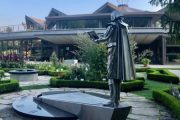We settled back on our buses and I thought about the development of ties and bonding that had evolved during the 22-day journey. There had been dramas and intrigues onboard, unrest here and criticism there, no personal space whatsoever, constant activity and considerable strain, but we had adapted and got used to each other. This arrival marked the end of the train journey and with it came a sense of loss combined with an eagerness to move on.
From this vigilant and controlled arrival, we moved on to attend the Non- Governmental Forum. Although originally slated to be in Beijing itself, the building had suddenly developed “structural problems” necessitating the site being relocated almost 2 hours away by bus. Shuttles which were supposed to leave every 20 minutes throughout the day, left the city at 7:30 in the morning only. The media had even more difficulties since there were no shuttles available for them and could only stay in one assigned hotel. This regimentation was quite incomprehensible to most of us but as time passed, I began to have a better understanding of how culture and history had shaped the psyche of these people. But I had doubts about attending the Forum. I felt it had been a mistake to hold it in China, not simply from a logistical point of view and the sheer enormity of the operation, but from their appalling human rights record.
Aside from the torrential rain causing mobility difficulties, lack of shuttles and no ramps for the disabled, there were plain clothes security guards everywhere. Incidents of following and closely monitoring the Tibetan participants was particularly disturbing. As I gazed around the thousands of women desperately trying to match buildings with map locations, discovering plenary sessions had been moved to buildings at the other end of the one square kilometre site, I was relieved that I had already had plenty of preparation of being in a huge group with frequent episodes of confusion and chaos. Rules and regimentation had dogged us in Russia and Eastern Europe and I for one had become suitably conditioned.
As I left the Women’s Forum, I reflected that this was only a small aspect of what I came to learn about the Chinese. The potential for warmth and friendliness behind the formal façade could be found whether it was over a bowl of dumplings, fellow bus and train riders or someone eager for a chance to speak English. In Beijing, the morning sight of literally thousands of people going to work on their bicycles was extraordinary.
A cliché of such lengthy travels could be “to find myself”. While this was not my original goal, inevitably I did get to know myself a great deal better; both the limits of my endurance dealing with challenges as well as acquiring an abundance of experiential learning. But the year was long and after 6 months of nomadic existence I yearned for home, friends and family back in Canada. This reoccurred sporadically throughout the year, but I soldiered on with what became a full-time job of seeking out places of interest and how to get there. In this way my travels continued into southern China and on to Tibet as my year of journeying unfolded, offering many wonders, contradictions and adjustments. Quite apart from the brief visits to nine countries with the Peace Train, I was later able to spend time in Tibet, Burma and Nepal to name some. An amazing and unforgettable experience, with many more stories to tell – a journey never to be minimised nor forgotten.

The official postcard of the Peace Train journey given to all participants.





Ed Janzen7 years ago
I would like to comment positively on Isobel Salole’s story, “Nine Countries in Twenty-Two Days”.
I have been to China and East Germany, when it was still East Germany and know of which she speaks. Good job.
Ed Janzen, Editor and Publisher CANADIAN STORIES
Marta Ware7 years ago
Hi Isobel,
I was intrigued to read your report on the Peace Train experience: the reading left me even more intrigued, as I sensed throughout that there was a huge memory store room of incidents behind the report. I feel certain that writing up a selection of these incidents would give the reader a window to more understanding, both of your Peace Train experience and of your journey towards self-knowledge. Lots of material, there!
Best, Marta
DIANA RIVINGTON5 years ago
Hello Isobel,
I attended the official Fourth World Conference on Women as an official negotiator and remember visiting the mud of Huairou. What an amazing adventure you had!